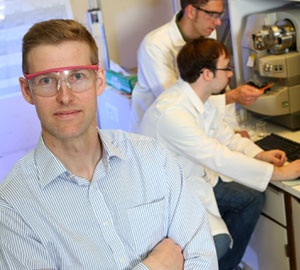 |
| David Jakeman in his lab at Dalhousie's College of Pharmacy. (Nick Pearce Photo) |
║┌┴¤│ď╣¤═° researchers will receive funding for a research project focusing on the creation of new molecules.
David Jakeman, professor at DalhousieÔÇÖs College of Pharmacy, will lead the research partnership ÔÇô one of┬á 31 innovative projects at 12 universities announced by the Honourable Gary Goodyear, Minister of State (Science and Technology) Thursday, July 8 at the University of British Columbia.
ÔÇťOur idea is to engineer microbes to produce some structurally-exotic new molecules and then study how they work as potential anti-bacterial or anti-cancer agents,ÔÇŁ says Dr. Jakeman, cross-appointed to the Department of Chemistry.
ÔÇťThink of the discovery of penicillin and its impact in the treatment of bacterial infections,ÔÇŁ he says. ÔÇťWe want to do similar sorts of studies to find out how these never-made-before molecules kill bacteria or cancerous cells ÔÇŽ We will engineer a soil bacteria to create a library of a natural products; we will isolate the natural products, derivatize them, and evaluate them in a variety of assays to discern their anti-bacterial and anti-cancer mechanism of action.ÔÇŁ
Dr. Jakeman says the project support is important because it will fund four graduate students for the duration of their studies. Those students include Stephanie Dupuis, completing a masterÔÇÖs degree in chemistry, Andrew Robertson, working towards his Ph.D. in chemistry, and Erin Feldman, initiating a masterÔÇÖs in pharmaceutical sciences, a new graduate program in the College of Pharmacy.
The government is investing $13 million overall for the projects through the Collaborative Health Research Projects program, an initiative of the Natural Sciences and Engineering Research Council of Canada (NSERC) and the Canadian Institutes of Health Research (CIHR). This includes $483,200 over three years for the Dalhousie-led project. Co-applicants are Sherri McFarland a professor from Acadia University, and fellow ║┌┴¤│ď╣¤═°professors Kerry Goralski, also at the College of Pharmacy, and Raymond Syvitski at the National Research Council, Halifax cross-appointed to the Department of Chemistry.
The program grants are designed to support new projects that involve partnerships between any field of the natural sciences or engineering and the health sciences, with an impact on the health of Canadians. Other projects receiving funding include ÔÇťsmartÔÇŁ stents for wireless monitoring of vascular disease, a contact-lens-based drug delivery system for glaucoma treatment and the first completely automatic anesthesia delivery system.
LINKS: |
